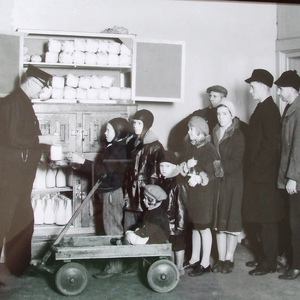Household management involves using resources wisely and being thrifty to stay within a budget. The word “economy” comes from the Greek word for household management, oikonomia. This management is difficult when people have too little money to buy what they need, which was the case for many after the stock market crashed in 1929. In an effort to make sense of what was going on, members of the U.S. government began to talk about what they called “the economy,” and they developed methods to quantify the situation and account for economic fluctuations. Listen to the story to learn more about the invention of what we call the economy and some of the means by which we measure its strength.
Listen to the story
MELISSA BLOCK: We’re going to cut through some numbers now that can sound like bureaucratic gibberish. The U.S. economy grew at an annual rate of 2.4 percent in the last three months of the year, according to government figures released this morning. Got it? Jacob Goldstein from our Planet Money team sheds some light on what that means.
JACOB GOLDSTEIN: If you’d asked somebody 100 years ago, how’s the economy doing? Is it growing? Is it shrinking? They would not have known what you were talking about. Back then, people talked about banking panics and national wealth, and trade. But this thing we call the economy wasn’t really invented until the 20th century.
ZACHARY KARABELL: It was invented because of the Great Depression.
GOLDSTEIN: Zachary Karabell is the author of a new book called “The Leading Indicators.”
KARABELL: And it was invented because there was clearly a perception that there was something really, really bad going on but they didn’t really know what. I mean, you could see there were homeless people on the street, you could see there were farmers, you know, the Okies heading from their Dust Bowl farms off to California by the tens of thousands, but there was no way of really grasping it.
GOLDSTEIN: So the government starts calculating this single, official number called national income. It’s the forerunner of today’s Gross Domestic Product, GDP, and it’s basically the value of all the goods and services produced in the country in a year. When it’s released in the Depression, this wonky statistic becomes an overnight sensation.
A report on national income submitted to Congress makes the bestseller list. And pretty soon, you can’t turn on the radio without hearing those numbers and what they’re measuring, this new thing called the economy.
KARABELL: Then, you start hearing about in 1937, Roosevelt starts talking about the economy and he starts talking about national income going up.
(SOUNDBITE OF ARCHIVED BROADCAST)
PRESIDENT FRANKLIN D. ROOSEVELT: That national income had amounted in the year 1929 to $81 billion dollars.
KARABELL: You’d never hear Abraham Lincoln or Teddy Roosevelt or George Washington talking in this way. One of the things that’s remarkable to me is how quickly we went from a world where none of these terms and none of this conversation was part of our national consciousness to it being at the center of our national consciousness.
GOLDSTEIN: In the decades that follow, national income becomes gross national product and eventually GDP and it sweeps the world.
KARABELL: The first thing you do in 1950s and ’60s if you’re a new nation is you open a national airline, you create a national army, and you start measuring GDP.
GOLDSTEIN: That’s because if you want help from the World Bank or the U.N., they’re going want to know, how does it affect your economy? But somewhere around this time, Karabell says, people start to make too much of GDP. Rather than a limited measure of the economy, it becomes this Cold War gauge of who’s doing better or who’s winning. And, so, perhaps inevitably, all that success leads to the GDP backlash.
Robert Kennedy famously calls out its shortcomings in 1968.
(SOUNDBITE OF ARCHIVED BROADCAST)
ROBERT KENNEDY: Gross National Product does not allow for the health of our children, the quality of their education, or the joy of their play. It does not include the beauty of our poetry or the strength of our marriages.
DIANE COYLE: It does what says on the tin, it measures the economy. We shouldn’t make it do something it was never intended to do.
GOLDSTEIN: Diane Coyle is an economist who just wrote a book called “GDP, A Brief But Affectionate History.” Coyle says GDP was never intended to measure overall well being or a nation’s standard of living. Certain things that are clearly bad actually make GDP go up, like hurricane damage that costs a lot to fix. And here’s another thing. The history of GDP is full of debates about what you should count when you’re adding it up.
For example, should you count the black market, which means everything from off-the-books babysitters to mafia drug deals? The U.S. doesn’t, other countries do. Back in the ’80s, Italy started counting its black market and overnight the Italian economy became bigger than the U.K. economy. The Italians celebrated. They called it Il Sorpasso. Coyle says this points to a common misconception.
COYLE: We tend to think about GDP as if it’s a natural object. It’s like a mountain, and we have methods of measuring it that are better or worse and more or less accurate. But there is a thing there to be measured. And actually, that’s not just true with the economy. There’s no natural entity called GDP in the universe.
GOLDSTEIN: In other words, maybe the most important thing to remember about GDP is it’s not a thing, it’s an idea. And that idea keeps changing. Just last year, the U.S. tweaked the way it calculates GDP and in an instant, the economy was $500 billion bigger. Jacob Goldstein, NPR News.
 © 2014 National Public Radio, Inc. Used with the permission of NPR. All rights reserved.
© 2014 National Public Radio, Inc. Used with the permission of NPR. All rights reserved. Vocabulary
- economy – the wealth and resources of a country or region, especially in terms of the production and consumption of goods and services
- Great Depression – the worldwide economic crisis and period of low business activity that began around the time of the October 1929 stock market crash and continued into the 1930s
- Gross Domestic Product (GDP) – the total market value of all goods and services produced within the borders of a country during a period of time (usually one year)
- gross national product – an estimate of total value of all of the goods and services produced by the residents of a nation during a period of time (usually one year), regardless of where the residents live
- standard of living – the level of wealth, comfort, material goods, and necessities available to a certain person or group
- Roosevelt – Franklin D. Roosevelt was the 32nd President of the United States; when he took office four years into the Great Depression in 1933, he quickly launched a set of largely successful programs known as the New Deal that were intended to restore confidence in the economy and create jobs for millions of unemployed Americans
- World Bank – an international financial institution established in 1944 to rebuild the Western economies shattered by World War II through financing of commercial and infrastructural projects, and that controls the distribution of economic aid between member nations and makes loans to them in times of financial crisis
Listening Comprehension Questions
- What facts support Robert Kennedy’s opinion of the shortcomings of Gross Domestic Product (GDP)?
- How do good things and bad things make GDP go up?
- How did the U.S. economy grow by $500 billion in 2013?
- What might be the result if the U.S. recalculated GDP and the economy were smaller?
Discussion Themes
- Why do you think the idea of national income became an “overnight sensation”?
- In your opinion, should we stop using GDP as an economic statistic? Why or why not?
Teacher’s Guide
Activate student knowledge: Open class by asking students what they know about the Great Depression. As background, you may want to convey that people in the early 20th century thought the stock market was a true wellness indicator for the economy. So, the stock market crash of October, 1929, destroyed people’s confidence in the economy. Over the next decade, businesses and banks were wiped out, and ultimately many people lost their jobs, homes, and entire life savings. At the time, the U.S. government did not have a complete and consistent set of data by which they could properly assess and manage the economy, the way we do today.
Introduce the story: In this audio story, you will hear an interview with Zachary Karabell, the author of “The Leading Indicators.” Karabell describes the circumstances that led to the invention of what we refer to today as “the economy.” Listen to learn about how the development of a set of metrics defined the way we measure and talk about the economy, including economic fluctuations, today.
Active listening supports: Choose one of the following listening organizers to support student understanding as they listen to the story.
- The Main Ideas and Supporting Details Chart will guide student listening as they takes notes on the invention of the economy and some of the indicators that measure its strength.
For example, the main idea might be that the economy was invented because of the Great Depression and the details might be:
- People knew something bad was going on with business and jobs and money
- Gov’t started calculating “national income”
- 1937 – Roosevelt starts talking about “the economy” in speeches
- The economy moved to the “center of our national consciousness”
- The Language Identification organizer allows students to follow along and track important phrases while listening to the story.
Paired Text: Use this 2017 article by Natalie Kitroeff and Jim Tankersley, U.S. Economy’s 3% Spurt Emboldens Tax Cut Supporters (and Critics), to pair with this audio story. Have students compare and contrast the information learned from the text and the audio, looking for examples of how various indicators do or do not indicate the strength of the economy.
Reflect on the story: Take time for student reflection on the audio story and discussion questions to check for understanding. Have students write about what would happen if the economy didn’t have indicators for how strong or weak it was and how that might affect people.


